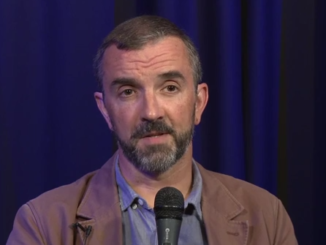
Brendan Gleeson has reunited with The Guard writer-director John Michael McDonagh, but it’s a mistake to expect Calvary to be The Guard 2. Calvary is a whodunit with a difference, an aspiring black comedy.
In a dark confessional Father James (Brendan Gleeson) is told about his impending death from a parishioner. The parishioner tells of the abuse he suffered as a child at the hands of the church and is hell bent on revenge. Gleeson as the church’s representative has been chosen to take the fall and has been given a week to put his affairs in order.
Just who is the parishioner hell bent on revenge? Father James knows the identity of his tormentor but the audience needs to wait and find out. An all-star cast offers up variations of who the potential killer could be.
Could it be the spirited local butcher (Chris O’ Dowd) or the arrogant squire and self-proclaimed lord (Dylan Moran)? Or how about the malevolent publican (Pat Shortt) or even the mischievous little doctor (Aidan Gillen)? They’re all as bad as each other and each one becomes the prime suspect at some point or other during the film. For all we know it could be Father James’ clumsy colleague Father Timothy Leary (David Wilmot).
Killian Scott steps away from his popular Love/Hate character of Tommy to swap tracksuits for bowties. Milo’s Asperger’s ensures there isn’t a fizzy orange out of place but, unlike Tommy, he is desperate for love. He turns to Gleeson’s Father James Lavelle for advice which as you can tell already goes well. Scott’s character Milo offers comedic relief at times when the film can seem like a burden on the viewer.
McDonagh deserves full credit for keeping all of these characters as suspects throughout. The London-born film-maker made a bracing debut with 2011’s The Guard, casting Gleeson as an unruly cop at large in Connemara. Yet Calvary is on a different plane of existence altogether. McDonagh bills this as the second part of his “glorified suicide trilogy”, although it might more readily be viewed as a rueful wake for the Catholic Church, mired in scandal with its authority waning.
Father James’s rounds carry him around Sligo, where the parishioners beat up their wives and snort cocaine in pub lavatories, barely bothering to pull the door closed behind them. The film is full of juxtapositions: faith and atheism, good and evil, adulterers and lonely singletons, the abused and the abusers. It is as uplifting as it is depressing. It’s ironic that the person happiest with life in Father James’ parish appears to be Gillen’s mordant non-believer, who sucks cigarettes outside the hospital and accepts his own limitations with a lip-smacking relish.
After years of strong performances in a series of well-publicised and received films, both big budget and less so, this is Gleeson’s biggest and best role to date. Written specifically for him, he owns the screen all the way to the unpredictable end.
Garrett Lavin
Image: filmsintown.com




Leave a Reply